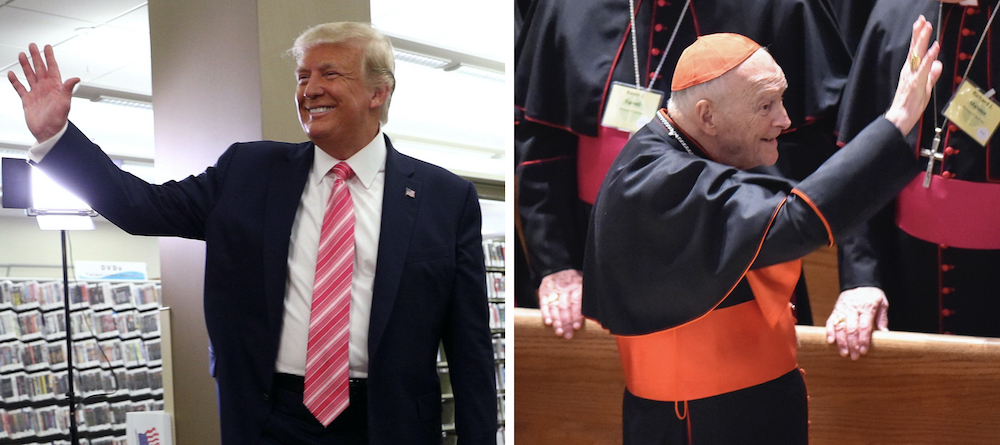
Left: President Donald Trump waves after voting in the 2020 presidential election at the Palm Beach County Library in West Palm Beach, Florida, Oct. 24 (CNS/Reuters/Tom Brenner); Right: Then-Cardinal Theodore McCarrick waves to fellow bishops as he attends a prayer service at the Cathedral of St. Matthew the Apostle in Washington Sept. 23, 2015. (CNS/Jonathan Newton, The Washington Post, pool)
Whether about ex-Cardinal Theodore McCarrick or President Donald Trump, their complementary stories provide background noise to the worldwide pandemic and save us the trouble of reading medieval history.
In a way, they are both about clericalism. One is the clericalism of church. The other is the clericalism of politics. It is about cronyism, capitulation and yielding to power.
Whether about church or state, the storyline, cast of characters and denouement are much the same. Each presents the downfall of a man whose path to power was paved by other people's money. Each reveals a man apparently in denial of the facts.
There is The Trump Story, which combines the "prosperity gospel" with an election fiasco. There is The McCarrick Story, the tale of clericalism wholly ignored and now partly revealed. Each conflates to one simple word: money.
Enter Trump, bombastic.
The adherents to the "prosperity gospel" believe that financial wealth is God's will for them. If they pray correctly, they will become rich. The rich are especially blessed by God and are examples for everyone else. Besides, history demonstrates that money buys holiness, or at least indulgences, and the monied class is always presumed holy. (The opposite is also true: The poor are not in God's graces.)
Advertisement
They who persist in denying the results of the 2020 U.S. presidential election are convinced, along with the outgoing president, that the rich will inherit the White House and the White House will make them richer. For the already wealthy, this is true. For the rest of the election-deniers, it is the hope and promise of the "prosperity gospel."
Enter McCarrick, wily.
Then there is the McCarrick situation, partially examined in an unsigned report now prominently placed on the Vatican website. In and of itself, the report is the epitome of clericalism. Unsigned and often quoting unnamed sources, the 449-page* document should be R-rated. Although salacious in part, nothing in it is new. It avoids directly confronting the component that greases the wheels of clericalism: money. In every case, money was involved. McCarrick bought dinners and plane tickets and vacations and friendships. He gave cash gifts to other clerics. Yet the word "money" appears only 21 times in the report.
In each of these sad stories, a Catholic bishop here or there supports the main character.
For Trump. Tyler, Texas, Bishop Joseph Strickland said no Catholic could vote for Biden, and now questions the election results. Now the U.S. Conference of Catholic Bishops (USCCB) is forming a task force, apparently to lobby the president-elect about abortion. Has anyone told them that they lost all political clout in 2002, when they voted to exclude themselves from sex abuse strictures?
For McCarrick. Three of four now-dead New Jersey bishops saw no evil when asked so many years ago if McCarrick, already passed over for Chicago and New York, should go to the red-hat diocese of Washington. Where was the USCCB then? Even the report's naysayers couched their warnings in "clericalese." Would money be involved in McCarrick's move from Newark to D.C.? Rome had been warned about him.
The devil, as they say, is in the details, and Pope Francis has said the devil enters through one's pocket. The devil has been very busy in the United States.
[Phyllis Zagano is senior research associate-in-residence at Hofstra University in Hempstead, New York. Her most recent book is Women: Icons of Christ, and her other books include Women Deacons: Past, Present, Future (in Spanish as Mujeres Diaconos: Pasado, Presente, Futuro), published in France and Canada as Des femmes diacres and in Portugal as Mulheres diáconos: Passado, presente, futuro. Study guides for these books are available for free download at https://sites.hofstra.edu/phyllis-zagano/.]
Editor's note: We can send you an email alert every time Phyllis Zagano's column, Just Catholic, is posted. Click here to sign up for email alerts.
*The number of pages of the McCarrick report has been corrected.








